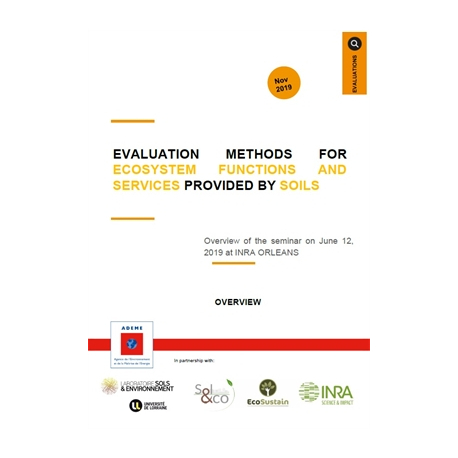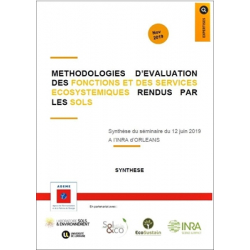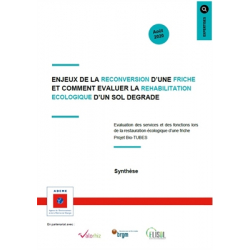 Agrandir l'image
Agrandir l'image
Evaluation methods for ecosystem functions and services provided by soils
Neuf
Although soils are central to dealing with the challenges of food security, access to drinking water, climate regulation, the development of renewable energy and the conservation of biodiversity, they can be degraded by poor management (erosion, artificialization, loss of organic matter). We need to improve our knowledge of soil functioning,[…]
Plus de détailsFiche technique
| Auteurs | CALVARUSO Christophe, BLANCHARD Anne, EGLIN Thomas, PIERART Antoine, GRAND Cécile, EcoSustain, UNIVERSITE DE LORRAINE |
| Public(s) | Bureaux d'études |
| Entreprises et fédérations professionnelles | |
| Collectivités territoriales | |
| Thématique | Urbanisme, territoires et sols |
| Agriculture, alimentation, forêt, bioéconomie | |
| Collection | Expertise |
| Date d'édition | 2019/09 |
| Nb. de pages | 32 P |
| Format | pdf/A4 |
| Langue | EN |
| Périmètre de publication | National |
En savoir plus
Although soils are central to dealing with the challenges of food security, access to drinking water, climate regulation, the development of renewable energy and the conservation of biodiversity, they can be degraded by poor management (erosion, artificialization, loss of organic matter). We need to improve our knowledge of soil functioning, and develop methods for evaluating the functions and services soils can provide, to evaluate and anticipate this degradation and propose solutions for restoring or managing soils. These methods should, in the long term, improve soil management to benefit from soil services sustainably, without degrading these soils, while meeting economic; social and environmental challenges. For many years, ADEME has supported numerous R&D projects in town planning and sustainable agriculture. This seminar aimed to bring together partners, both government and private, involved in R&D (research institutes and universities, chambers of agriculture, planning offices, government agencies, soil analysis laboratories) in order to: • Assess the physical, chemical and biological characteristics used to evaluate the functions provided by soils and their ecosystem services • Determine the scientific and/or technical issues which are still sticking points • Gain a better understanding of using these methods to evaluate the functions and services for assessing soil quality in agricultural and urban areas (selection of practices, types of situation). The seminar was organized with expert speakers in the morning followed by workshops using realistic scenarios in the afternoon. A literature review on soil quality assessment based on forty national and foreign research projects, was used to determine and study the different soil characteristics considered to evaluate soil functions and services in agricultural and urban context. From this state of the art outcome the first step for technological and practical developments in the future. The seminar also focused on the research carried out into the evaluation of several soil functions which now have practical evaluation methods that are in use, for which there is feedback and an interpretation based on physical, chemical and/or biological characterization of the soil. Three soil functions were presented: • Carbon storage and sequestration • Water retention, circulation and infiltration • Nutrient retention and supply The workshops in the afternoon discussed the selection of the most appropriate characteristics for evaluating soil quality in two scenarios selected by the organizers: the protection of a water catchment area in an agricultural setting and an urban project involving soil quality criteria in an urban setting. Based on these two scenarios, the aim was to set up collectively a list of essential ecosystem services, to list the functions responsible for providing these services and the physical, chemical and biological characteristics required to evaluate them. This report summarizes the main discussions during the seminar and presents a number of topics to develop on the subject.




